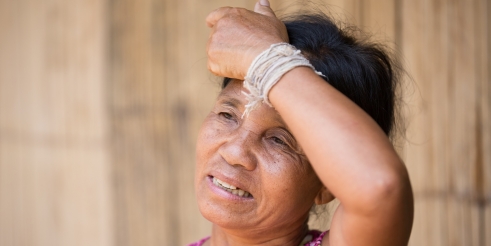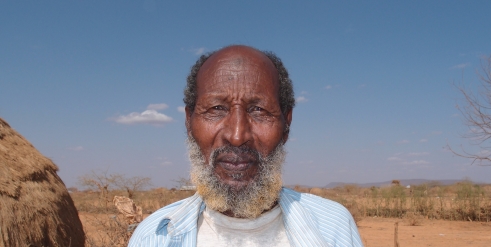
(c) Robin Wyatt/HelpAge International
Sixty-five-year-old Nalon has to endure heatwaves and forest fires in her village in Thailand
By Ben Small
Climate change poses significant risk to older people. They are disproportionately vulnerable in a world that is growing ever more volatile.
To coincide with the 2015 Paris Climate Conference, or COP21, today we launch a new position paper Climate change in an ageing world. It provides a series of recommendations on how to protect older people from the impacts of climate change.
“Making use of older farmers’ knowledge on resilient agriculture, prioritising access to clean, sustainable energy, supporting inclusive disaster risk reduction (DRR) strategies to prepare for extreme weather events, and providing age-specific medical support during heatwaves is going to be essential to mitigate the effects of climate change on older people,” said Clodagh Byrne, Disaster Risk Reduction and Resilience Adviser at HelpAge International.
The growing number of older people and their vulnerabilities
Not only are older people at risk from the impacts of climate change, this age group is also rapidly growing in number.
Today, there are 901 million people aged over 60 globally. By 2030, this is set to grow to 1.4 billion, and three-quarters of this figure will live in developing countries.
The fact we are living longer is major accomplishment for humankind, but it poses significant challenges, and adapting to a world that is both ageing and experiencing the impacts of climate change is chief among them.
“Ten years ago, there was always somewhere to go to for better pasture,” said Mohamed, 60, a farmer from Kenya who has experienced the worst impacts of drought.
“This drought is different. Now there are no pastures, no water and no rain.”

(c) Gacheru Maina/HelpAge International
Mohamed has struggled when drought hits his region of Kenya
For older people like Mohamed, poor mobility means travelling long distances to reach supplies is difficult or impossible, and leaves them less able to flee danger. Weak immune systems cause increased susceptibility to disease among older people, and chronic health problems and social isolation make coping with climate-related stresses much harder.
Three-quarters of those who died during Hurricane Katrina in 2005 were aged over 60, yet they made up just 16% of the local population – this statistic speaks volumes about older people’s vulnerabilities.
What can COP21 do?
The report insists that world leaders at COP21 must come to an agreement about climate change to ensure the temperatures are kept below the 2°C threshold. This is vital to mitigate the most severe impacts of global warming.
Even if such an agreement is made and adhered to, climate change will still pose risks to older people and other vulnerable groups across the world.
Therefore the outcomes of COP21 must take into account the world’s ageing population and its specific needs, while ensuring their participation in implemented strategies.
Older people’s humanitarian requirements must be understood by speaking to those most at risk, while their years of experience of weathering through – and recovering from – previous natural disasters can be invaluable when feeding into DRR techniques.
“The conference is an unprecedented opportunity to move towards a resilient, low-carbon world and protect the wellbeing of everyone. But any effective climate change framework must respond to the rights and vulnerabilities of older people to reflect the convergence of population ageing and climate change,” added Byrne.
Without an age-inclusive agreement at COP21, older people will be further marginalised, their safety will be compromised, and many more will die during natural disasters in the coming years and decades.
